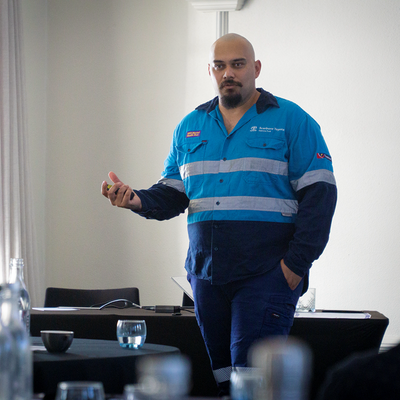You deserve support no matter what you’re facing
Reaching out can feel overwhelming, especially if you’re not sure how to put what you're feeling into words. You might be thinking: ‘I don’t even know where to start’ or ‘I’m not sure what’s going on; I just know I don’t feel okay.’
When it comes to contacting Lifeline, you don’t need to have it all figured out. A simple moment of courage is enough. Whether reaching out through 13 11 14, text, or chat, our crisis supporters are here to gently guide the conversation and hold space for whatever you're going through.
On top of not knowing what to say, it’s common to second-guess yourself when things feel heavy. You might have thoughts like: ‘Other people have it worse’, ‘This probably isn’t a real crisis’ or ‘I should be able to handle this on my own.’
Here’s what we want you to know: If you’re feeling unsafe, overwhelmed, or just 'not okay' - that’s enough.
“A crisis is anything that makes you feel like you can’t cope right now.”
Whether you're wanting support for yourself or are worried about someone else, this support guide is designed to help you feel a little more ready to reach out to Lifeline.
What to expect when connecting with a crisis supporter
Whether you reach out via 13 11 14, text, or chat, your Lifeline crisis supporter will:
- Listen without judgement
- Give you space to talk or type about what’s on your mind
- Help you make sense of what you’re feeling
- Support your safety and wellbeing
- Work with you to decide any next steps if that’s something you want.
While you're waiting to be connected, it can help to start noticing what you’re feeling. Naming your emotions, even roughly, can take some of the intensity out of them and help you feel a little more grounded.
You might try starting with: ‘Right now I feel...’
Don’t worry if it’s more than one thing: ‘angry, numb, unsure, sad, too much’
If you're struggling to find words, you might like to try a comparison: ‘It feels like a storm,’ ‘like everything’s buzzing,’ or ‘like fog’.
- If you're feeling stuck or unsure how to begin, these simple phrases can help open the conversation:
- ‘I don’t know where to start, but I need to talk.’
- ‘I’m feeling really overwhelmed right now.’
- ‘I don’t even know what I’m feeling, but I don’t feel okay.'
It’s also okay if you need a moment to cry, breathe, or sit in silence. You’re not alone, and you’re never too much.
You deserve to feel heard, even if you don’t know what you need yet.
Reaching out for someone else
If you’re worried about someone in your life (a family member, friend, neighbour, colleague, or anyone in your community), you can contact Lifeline. You don’t have to be in crisis yourself to reach out.
Caring for someone else can feel heavy, and you don’t need to handle it alone. Our crisis supporters are here to:
- Listen to what’s going on for you and the person you're concerned about
- Help you talk it through and explore what support might look like
- Offer guidance on how to care for yourself while caring for someone else
- Support your own wellbeing, too.
Remember, you don’t need to have the ‘right’ words or a clear plan.
- You might say:
- ‘I’m worried about someone in my life and don’t know what to do.’
- ‘I want to help a friend who’s struggling, but I’m feeling overwhelmed too.’
- ‘I just need to talk this through with someone.’
Whether you’re reaching out because someone’s in immediate danger or you’ve just noticed a change in their mood, you’re doing something important by reaching out.
Looking after others starts with looking after yourself. Lifeline is here for both.
Calming strategies for before, during, or after your Lifeline interaction
When we’re in distress, our brains go into survival mode. The part of the brain that helps us put thoughts into words can go quiet while the part that manages fear gets loud. That’s why it can be hard to talk or even think straight when you’re feeling really overwhelmed.
Below, we’ve listed quick techniques that you can use to help calm your body and mind. This can make it easier to start a conversation or sit with what you’re feeling.
You don’t need to do them perfectly. Just give them a go and see what feels right for you.
- Box breathing
When we’re stressed or anxious, our breathing often becomes fast or shallow without us realising it. Slowing it down can signal to your body that you’re safe. Box breathing is a simple breathing pattern that can help you regain a sense of calm.
How to do box breathing:
- Inhale through your nose for 4 seconds
- Hold your breath for 4 seconds
- Exhale through your mouth for 4 seconds
- Hold again for 4 seconds
- Repeat for a few rounds.
If counting feels tricky, you can follow along with our guided video below.
- 5 senses technique
- Feel your feet or hands
- Recite something in order
- Progressive muscle relaxation (PMR)
Tips for figuring out next steps
After talking to a crisis supporter, you might feel a mix of things: relief, exhaustion, uncertainty, or even a little stuck. That’s really common.
Reaching out is a powerful step, but it doesn’t mean everything feels clear straight away.
You don’t need to have it all figured out right now. You’ve done something important by reaching out, and that matters.
When you're ready, here are a few gentle ways to keep moving forward:
- Take a moment for self-care: Explore ideas that can support your emotional wellbeing, whether that’s rest, movement, connection, or something creative. Click here to read our support guide on self-care for mental health and wellbeing.
- Create a safety plan: If feelings of distress come and go, a safety plan can help you feel more prepared. The Beyond Now app and web tool guides you through it step-by-step and can be updated anytime. Click here to learn more about suicidal thoughts and the importance of safety planning.
- Learn more about what you’re feeling: Our mental health and wellbeing articles cover common challenges like navigating grief, managing addiction, and supporting someone else.
And remember - the Support Toolkit is always here. Whether you’re having a tough day, looking for guidance, or just want to feel a little less alone, you can come back to it whenever you need.
Real stories from others who’ve reached out to Lifeline
Sometimes, hearing from others who’ve reached out can remind us we’re not alone and that things can shift, even in our hardest moments.
Below, you can read or listen to real stories from people who contacted Lifeline and found support, strength, and moments of hope when they needed it most.
Click here to discover more stories from people who’ve held on to hope.
Finding the support that’s right for you
Lifeline is here for all Australians, anytime and for any reason. If you prefer to connect with a service that better reflects your identity or experiences, that’s completely valid.
Your wellbeing matters, and you deserve support that feels safe and culturally respectful. Scroll down to find the option that feels best for you.
Search for more services
Use the Lifeline Service Finder to search for more local and national services available to help support you.















